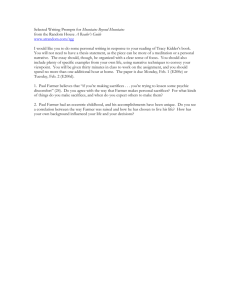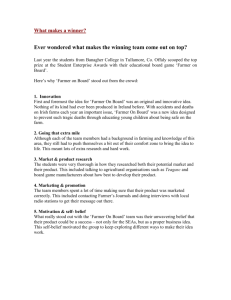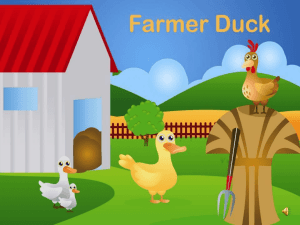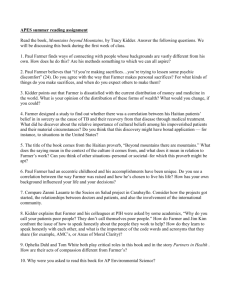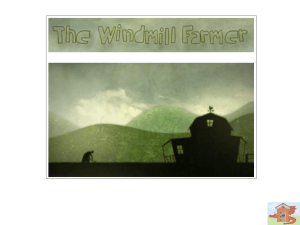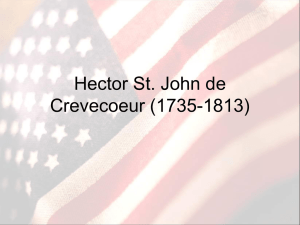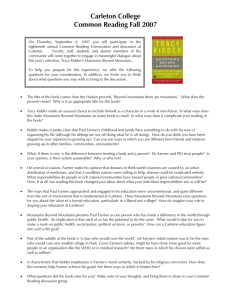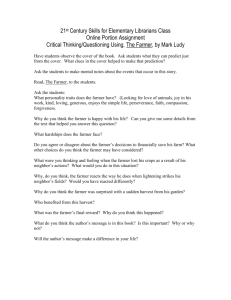First Semester Self-Evaluation and Reflection
advertisement
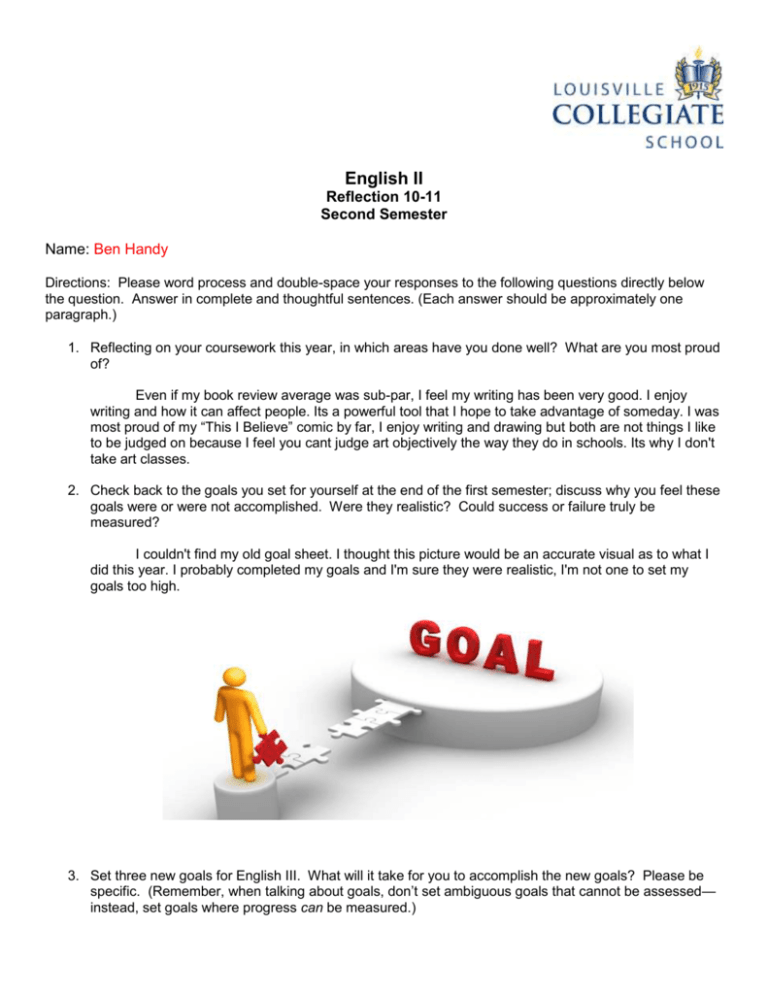
English II Reflection 10-11 Second Semester Name: Ben Handy Directions: Please word process and double-space your responses to the following questions directly below the question. Answer in complete and thoughtful sentences. (Each answer should be approximately one paragraph.) 1. Reflecting on your coursework this year, in which areas have you done well? What are you most proud of? Even if my book review average was sub-par, I feel my writing has been very good. I enjoy writing and how it can affect people. Its a powerful tool that I hope to take advantage of someday. I was most proud of my “This I Believe” comic by far, I enjoy writing and drawing but both are not things I like to be judged on because I feel you cant judge art objectively the way they do in schools. Its why I don't take art classes. 2. Check back to the goals you set for yourself at the end of the first semester; discuss why you feel these goals were or were not accomplished. Were they realistic? Could success or failure truly be measured? I couldn't find my old goal sheet. I thought this picture would be an accurate visual as to what I did this year. I probably completed my goals and I'm sure they were realistic, I'm not one to set my goals too high. 3. Set three new goals for English III. What will it take for you to accomplish the new goals? Please be specific. (Remember, when talking about goals, don’t set ambiguous goals that cannot be assessed— instead, set goals where progress can be measured.) I want to do all my homework this coming year, because apparently its kind of important half way through the year when you have a 70% in a class. I'll have to keep up with English and treat it with just as much importance as any other class I'm taking, even AP Chem. That's pretty much it really, that goal encompasses pretty much everything I want to improve on. 4. Of all the texts we’ve read this semester (Othello, Maus, Persepolis, Life of Pi, Mountains Beyond Mountains) which was your favorite? Why? Which was your least favorite? Why? Life of Pi was definitely my favorite book out of the ones we read this year. The whole survival aspect of it and the differing plot lines made for a quick and interesting work of fiction. However, certain questions on certain reading quizzes were quite outrageous. Regardless of this fact, the whole experience of this novel was the best out of any of the books we read. I hated Othello. Shakespeare is way overrated in my humble opinion. 5. Answer five questions from the Mountains Beyond Mountains Discussion Questions handout. (See below) 6. Discuss your experience completing the This I Believe Project or the Human Rights Film Project. Was it meaningful? Was it enjoyable? Did you learn something new? Explain. Meaningful and enjoyable as my end project hopefully shows. I love it when I'm given open ended assignments like these because, in my opinion, they actually test someone in the three most important aspects of writing: creativity, fluidity, and imagination. It also gave me a chance to explain something that means (excuse me for this) a shit-load to me. 7. Look at your Year-End Reading Record; how many books did you read over the course of the 2010-2011 Academic Year? How many total pages did you read? Are you satisfied with your totals? Why or why not? Explain. 8. If you should have any other questions, comments or concerns, feel free to discuss them here; any constructive criticism or, more importantly, laudatory remarks are welcome. English II Mountains Beyond Mountains Discussion Questions Directions: Answer five of the following twenty questions to complete # 5 1. What do you think the book achieves? For you personally? For society? Do you think that Paul Farmer inspires others to work for the common good? How can global citizenship and civic engagement be empowered on Louisville Collegiate’s campus? I'm not sure what this book achieves in tangible differences made. I'm sure many people after reading it have decided to donate more money to charities and the like. The real difference made is intangible. Changes on the inside of people, a better understanding of truth and the lives people live everyday. Its powerful and destroys ignorance. Paul Farmer stops the diseases from bacteria, Kidder stops the disease of ignorance. 2. How is Farmer’s medical work related to his sense of self and sense of community? What did you learn about his medical convictions and for the people living in poverty? About faith and medicine? What shaped Farmer’s values and world view? 3. What is Paul Farmer’s view of public policy and health issues? What does he advocate in Haiti, Peru, and Russia where health care is expensive and not accessible to most? What do you think of his ideas? Do you think they are applicable to the United States? How important are utilitarian principles (greatest good for the greatest number of people) to public health? 4. What does Farmer mean to you when he says, “To understand Russia, to understand Cuba, the Dominican Republic, Boston, identity politics, Sri Lanka, and Life Savers, you have to be on top of this hill?” 5. Do you think that Paul Farmer’s childhood and family had an influence over the choice he made professionally, or about his way of seeing life in general? What about the factors that influenced your choices in life, your goals, your world view? Of course his family and childhood affected his future decisions. If there is an occurrence in which someone's future ideas don't stem from childhood events, I'd be surprised. The same goes for me, the decisions I've made and will make are directly connected by a cause and effect system that rules all of our lives. 6. One of Farmer’s patients describes him as a saint and Kidder suggests that the Zanmi Lasante clinic in Haiti is a miracle. Farmer speaks openly of spirituality and religious belief. What role do you think faith plays in his life and in the projects to which he is connected? “God's Work”, or “Gods' Work” if you're really religious, definitely has an effect on Farmer. He believes that he is helping the world and that this is God's plan for him, his vocation. The god he has made for himself, as everyone does, is leading him to make these decisions. We all create our own interpretations of god. 7. Paul Farmer is able to connect with people with very diverse socioeconomic and intellectual backgrounds. He moves people who meet him to look beyond their personal interests and commit to the betterment of the world. Although "lives of service depend on lives of support," what personal and familial sacrifices does this require? Would you feel differently if Farmer were a woman? Farmer is clearly a wordsmith, and a charismatic leader. Without these qualities, he'd be a hell of a lot less successful. Sociopaths rarely get book deals like this. Regardless, he is truly a worldly individual, capable of understanding and reading people from every background. I most definitely would feel differently if he was a she. I'd be like “Why's she named Paul?” lol. 8. What do you think of his Farmer’s convergence of his political, medical, and social public positions as a doctor? Do you share his attitude? Do you think this blending is effective? 9. How do you think Tracy Kidder is affected by Farmer? Why does he portray his own feelings towards Farmer? Is Kidder’s use of direct quotes to reveal Farmer's character and his own effective? 10. What does the Haitian proverb “beyond mountains there are mountains” mean in your life? It means that life continues on forever. Its a perpetual, beautiful, and mundane cycle that keep us all guessing. Basically the song “Forever Young” describes this dilemma perfectly. It means to me that I'll never go on a real adventure, something I really want in my life. With the introduction of world media, there's rarely something new to me, something worth exploring. 11. Discuss the implications for “a minor error in one setting of power and privilege could have an enormous impact on the poor in another” (78) by exploring the impact of the eradication of the Creole pig and the building of the Peligre dam had on Haiti. 12. The sister of a pregnant Haitian woman with malaria stated, “You can’t even get a blood transfusion if you’re poor…we’re all human beings” (80). What does that statement mean to you? It describes to me the overpopulation of the world and how eventually we'll all have to live like these women. With the rising world population, I have no idea how we'll ever be able to sustain us all in the way Paul Farmer is trying to do and the Heifer program describes. Its sad really. 13. What does Farmer’s philosophy of “the only real nation is humanity” mean to you? A global society is really the only plausible step towards world peace in my opinion, having one people and one world of utter sameness generates a system of neighborly love that is extremely infectious. I see it happen every summer at my camp. 14. Farmer says, “Clean water and health care and schools and food and tin roofs and cement floors, all of these things should constitute a set of basics that people must have as birthrights (91). Do you agree? As I stated in number twelve, there is no way that, in the near future or even right now, we could possibly sustain every single human being in this manner. This statement to me seems utopian and impossible; dare I say maybe even naïve. 15. Do you agree with Margaret Mead's statement, “never underestimate the ability of a small group of committed individuals to change the world”? The British underestimated the Founding Fathers. I entirely agree. I feel this example is sufficient as an answer. 16. How is Haiti "covered with the fingerprints…of France and the United States?" (73) In what ways are wealthy countries responsible for the poverty of other countries? 17. Farmer believes we should give more of the world's wealth to the poor: the O for the P (the central imperative of liberation theology). Do you agree with the idea that we should have a preferential option for the poor? 18. How do MDRTB and AIDS threaten the health of the world? What role does Farmer take in trying to make countries more involved with the treatment of patients, prisoners and poor people? 19. Consider issues of social justice that are closer to home: Would Farmer’s efforts be more appropriately directed to public health projects in poor communities in the United States? Engage in a discussion of basic rights (political, civic, social, human) and distribution of public health resources (nutrition, transportation, housing, pest control, sanitation, medicine). 20. Look up the website for Partners in Health ( www.pih.org). What gets your attention? Would you consider making a donation? Why or why not. Thoroughly explain your answer. *I apologize if some spacing or formatting is off, I'm using a program call “open office” because I'm on my own computer and sometimes the transfer can cause some spacing/paragraph issues. I hope I won't be penalized for this as its not entirely my fault.
